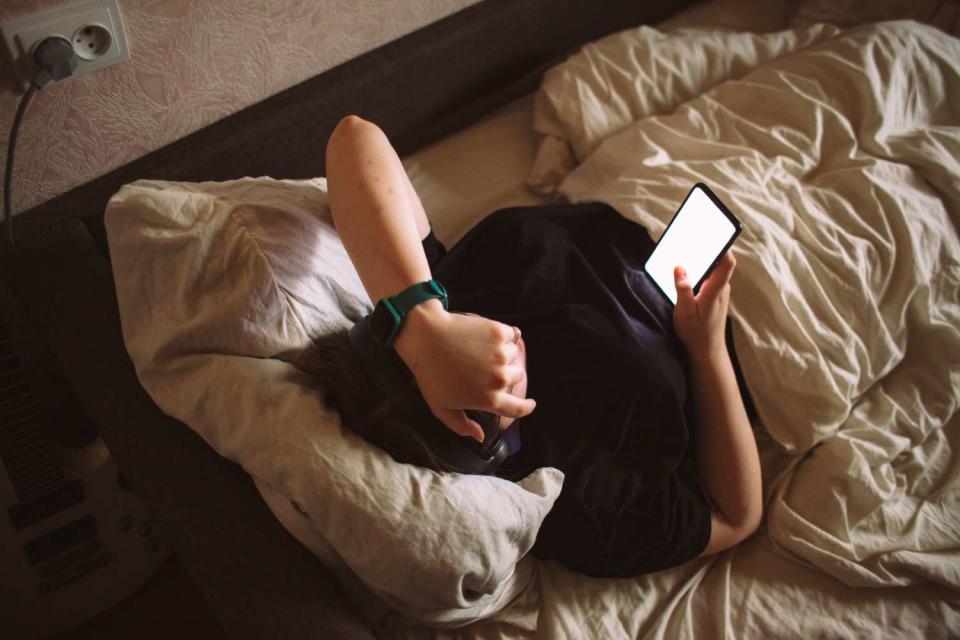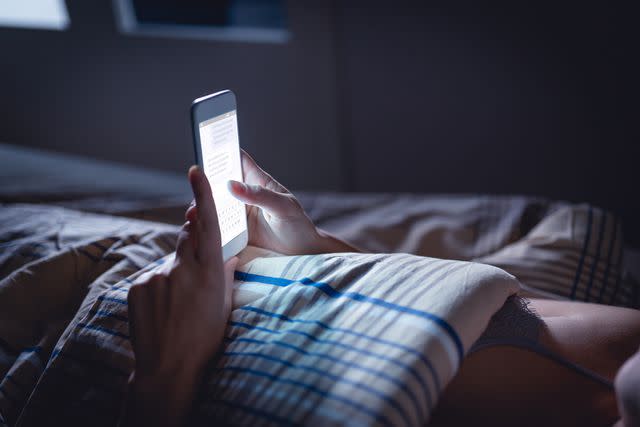Yes, Your Smartphone Is Keeping You From Sleeping — and Not Just Because You're Scrolling
A new study found that the blue light used by your smartphone is disrupting your melatonin levels — but there is a way you can scroll and get a good nights sleep

Getty
Stock image of a person reading from their smartphone before bedtime.Scrolling on your smartphone is keeping you from getting a good night’s sleep — and it’s not just because you’re staying up late.
It’s also because of the blue light used by the phone.
“Smartphone usage, especially without a blue-light filter, exerts pronounced suppressive effects on melatonin,” a new study, published in the journal Brain Communications, found.
Melatonin is a hormone the body creates that plays an integral part in sleep, the Mayo Clinic explains. “The production and release of melatonin in the brain is connected to time of day, increasing when it's dark and decreasing when it's light. Melatonin production declines with age.”

Getty
Stock image of a person reading from their smartphone before bedtime.The study measured the sleep of 68 male participants over a period of two weeks, who read for 90 minutes from a printed book, from a smartphone with a blue light filter on — and from a smartphone without a blue light filter on.
“While subjective sleepiness remained unaffected, we observed a significant melatonin attenuation… immediately after reading on the smartphone without a blue-light filter,” the study found.
Related: How Smartphones Are Hurting Our Kids’ Mental Health: ‘There’s Massive Evidence of Harm‘ (Exclusive)
Also, the older you are, the stronger the effect of the blue light on your melatonin levels. “Adolescents demonstrate a more rapid recovery from the melatonin suppression than young adults do,” the study said.
“Light strongly affects circadian rhythms. Morning light strikes the retina of your eye and sets up a chain of circadian hormonal reactions that signal the body to begin daytime alerting processes,” the CDC explains. “Blue light, a wavelength component of daylight, has the strongest effect,”
Never miss a story — sign up for PEOPLE's free daily newsletter to stay up-to-date on the best of what PEOPLE has to offer, from celebrity news to compelling human interest stories.
A report from Harvard Health recommends “shift workers and night owls could perhaps protect themselves if they wore eyewear that blocks blue light,” calling the light, commonly emitted by smartphones, a possible “potent suppressor of melatonin.”
However, you can still read from your phone, the study says — with one restriction.
Related: Celebrities' Best Sleep Hacks
“Nighttime smartphone reading does not appear to interfere with whole-night sleep…if the smartphone is put away 1 h before bedtime,” the study said. “It is advisable for adolescents and young adults to avoid exposure to LED screens in the last hour before bedtime, which is in line with general sleep hygiene recommendations.”
The PEOPLE Puzzler crossword is here! How quickly can you solve it? Play now!
A recent study found that more Americans are taking supplemental melatonin to sleep — with the number reaching for the sleep aid doubling in the last decade. And more children have been hospitalized for accidental melatonin overdoses.
Experts from the American Academy of Pediatrics say a low dose of 0.5 mg or 1 mg taken 30 to 90 minutes before bed is appropriate for children. Additionally, children who benefit from melatonin should not consume more than 3 to 6 mg.
For more People news, make sure to sign up for our newsletter!
Read the original article on People.

